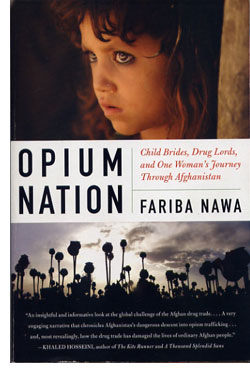 |
 Fariba Nawa
Fariba Nawa
Opium Nation: Child Brides, Drug Lords, and One Woman's Journey Through Afghanistan
Harper Perennial / HarperCollins
US Trade Paperback First Edition
ISBN 978-0-061-93470-4
Publication Date: 11-08-2011
360 Pages; $14.99
Date Reviewed: 12-24-2012
Reviewed by: Rick Kleffel © 2012
Index:
Non-Fiction
Identity is a slippery idea. National? Personal? Family? Intimate? Public? Take your choice of any single version and you'll find the rest inextricably involved. Any boundary you might try to make will be breached. Look in the mirror and eventually the entire world looks back at you. As 'Opium Nation: Child Brides, Drug Lords, and One Woman's Journey Through Afghanistan' begins, Fariba Nawa makes a difficult and dangerous border crossing from Iran into the country of her birth, Afghanistan. It's a homecoming and not the first step she takes towards a resolution, a restoration that can never take place.
'Opium Nation' combines the personal and the political with the identities of individuals and the identities of nations using memoir and deeply-researched reporting in a story that hopscotches around the world to save a child in the present as it traces Nawa's childhood and her trips to her homeland in the present day. Her own story is harrowing enough. As a young girl in a middle class family in Afghanistan, she saw one of her classmates killed by a Soviet bomb. Her grandmother escaped being shot by mere inches, and in the 1980's, the family fled carrying what they could on two donkeys over the Iranian border.
In the present day, Nawa returns to her homeland to find it overcome by the opium industry, a blight that reaches into every life. Nawa, who has spent most of her life in America but always considered herself both American and Afghan, explores the cities of her childhood and beyond to expose corruption, crime, murder, child slavery and pretty much every abuse that humans can heap upon one another, all as a result from the pursuit of poppy profit. Drugs, tradition, modern warmongering and inept nation building combine to create a disaster that Nawa lets readers experience in terms both practical and very, very personal.
"
"
As an expose of a country funded largely by illegal drug sales, 'Opium Nation' offers readers a tense, internationally flavored vision of true crime on a grand scale. Nawa rings up the facts and the figures to paint a picture that is truly alarming. From an ancient tradition to a modern economy, Afghanistan is made for growing opium poppies. The US involvement is undeniable and our mistakes are many, apparent and tragic in perfect hindsight. As a work of investigative journalism, you'll not find a better, more clear-headed work of drug-trade reportage.
But Nawa herself is part of the picture; she's intimately involved in her own reporting and this makes the book more than a mere work of non-fiction. 'Opium Nation' is a heartbreaking tragedy, with intense characters helplessly ground up by the world's desire for heroin. Nawa centers the stories around Darya, a child bride whose life has been bartered away; at the age of 12, she is given to a man more than three times as old as she. Nawa is there to see her rebel and she reminds Nawa of herself at that age. A bond is formed that extends to the readers' hearts. 'Opium Nation' is a profoundly affecting and clear-eyed journal of the needle and the damage done.
Even if she simply stuck to the mere facts of her experiences in Afghanistan, Nawa would clearly have had a powerful story on her hands. But her ability to weave so many stories, both good and bad, to give an even-handed version of her stories and to do so with the grace and economy she achieves makes the book far more than just a work of investigative journalism or memoir. Fariba Nawa both starts and finishes the book as a profoundly divided soul. She is American, Afghan, and a country, indeed a world unto herself. Read 'Opium Nation' and you may see quite a bit more when next you glance in the mirror.
|
 |




